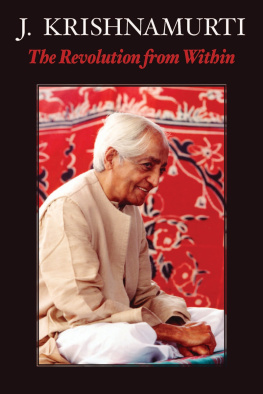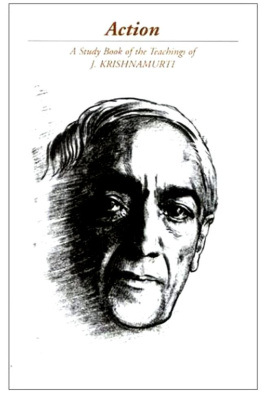Krishnamurti - The Revolution from Within
Here you can read online Krishnamurti - The Revolution from Within full text of the book (entire story) in english for free. Download pdf and epub, get meaning, cover and reviews about this ebook. publisher: Hohm Press, genre: Religion. Description of the work, (preface) as well as reviews are available. Best literature library LitArk.com created for fans of good reading and offers a wide selection of genres:
Romance novel
Science fiction
Adventure
Detective
Science
History
Home and family
Prose
Art
Politics
Computer
Non-fiction
Religion
Business
Children
Humor
Choose a favorite category and find really read worthwhile books. Enjoy immersion in the world of imagination, feel the emotions of the characters or learn something new for yourself, make an fascinating discovery.
- Book:The Revolution from Within
- Author:
- Publisher:Hohm Press
- Genre:
- Rating:4 / 5
- Favourites:Add to favourites
- Your mark:
- 80
- 1
- 2
- 3
- 4
- 5
The Revolution from Within: summary, description and annotation
We offer to read an annotation, description, summary or preface (depends on what the author of the book "The Revolution from Within" wrote himself). If you haven't found the necessary information about the book — write in the comments, we will try to find it.
The Revolution from Within — read online for free the complete book (whole text) full work
Below is the text of the book, divided by pages. System saving the place of the last page read, allows you to conveniently read the book "The Revolution from Within" online for free, without having to search again every time where you left off. Put a bookmark, and you can go to the page where you finished reading at any time.
Font size:
Interval:
Bookmark:
The Revolution
from Within
J. Krishnamurti
HOHM PRESS
Chino Valley, Arizona
2009, Krishnamurti Foundation of America
Published, under license, by
Krishnamurti Foundation of America
PO Box 1560
Ojai, California, 93024
Cover design by: Zac Parker, Kadak Graphics, Prescott, Arizona
Interior layout and design: Becky Fulker, Kubera Book Design, Prescott, Arizona
ebook ISBN: 978-1-935387-65-7
Excerpted from The Collected Works of J. Krishnamurti
Vols: VII, VIII, IX, X & XI; copyrighted material, The Krishnamurti Foundation of America
Contents
Ojai, California | |
Bombay | |
London | |
Ojai, California | |
Amsterdam | |
London | |
Madanapalle, India | |
Brussels | |
Hamburg | |
New Delhi | |
Madras | |
Colombo, Sri Lanka | |
Poona, India | |
Madras | |
Bombay | |
Madras | |
Bombay |
Foreword
Changing Oneself, Changing the World
David Skitt
R unning like a gold thread throughout these talks Krishnamurti gave in the nineteen-fifties is the subject of change. Most of us would agree with the postulate in science that change is the only permanent factor of the universe, and evolutionary biology tells us that the survival of a species, including our own, depends on genetic changes that best adapt to the demands of a constantly changing environment. The changes that occur in our bodies are also ones that we take for granted.
We have no difficulty then in acknowledging change in what we call matter. But what about change in the nature of the mind and in human behaviour? We know that there is often widespread support for our politicians to change, but this usually ends up in replacing them. Yet such is the power of the very word change that where no democratic process prevails or is discredited, whole societies can be overthrown by revolutionaries simply chanting the word like a mantra. The results, in the twentieth century, proved, as we know, to be calamitous. Trying to change society while leaving the individuals who constitute society unchanged is something that we now see as a very dangerous error.
Bringing the notion of change closer to home, to personal relationships, most of us have said or heard it said, You cant change human nature. Or, You have to take me as I am. Or, He [or she] will never change. And when we do change occasionally, it seems mostly to be under the pressure of events or at the urging of others.
So there seems to be something of a discordance here. The physical universe changes all the time. And a species, including the human one will have a better chance of surviving if it changes genetically in a way that fits the environment. But we seem to assume that a change in the human mind, particularly of a fundamental kind, though found desirable when we look around us and within ourselves, is impractical or too demanding. We may even find it somewhat disturbing. Also, we have no clear sense of how far such a change may go.
How does Krishnamurti approach this issue? Perhaps disconcertingly for someone reading him for the first time, he states as obvious that if we are a serious human being we must be deeply concerned with bringing about a radical transformation of our relationships, our way of thinking, and understanding of religion. Now, first of all, he asks, do we see that such a transformation is essential? If we do not, he argues, we need simply to observe the state of the world, its conflict, violence, confusion, and massive and avoidable human suffering. What, he asks, is the responsibility of a human being who sees that?
Well, a critic might object, Im just an ordinary person, and all that nastiness going on out there has nothing to do with me. Krishnamurti challenges that objection head-on. First, he says, we cannot afford to be ordinary any more, the challenge of the world is too great. Second, psychologically speaking, none of us are on the sidelines of the world, we are all in the thick of itwe are the world. Human problems are not personal but universal.
So what can bring about a radical change in our minds? Krishnamurti approaches this question by inviting us to first observe our state of mind as it is now , to watch it without condemnation or judgementlike a child that one loves... wandering into the depths of ones mind without calculation or intention. Only when aware of the limitations of thought, of the known, of its time-bound quality, of the stunted shaping of us by the past and by our cultural and religious conditioning, can there be a new state of mind.
This is only one of the many aspects of psychological transformation that are covered in these talks, and clearly this preface can only single out a few. But again and again Krishnamurti maintains that change cannot be brought about by any act of will, of wanting to be or become somebody or something. There is irrefutable logic hereif my mind malfunctions, does not work well in certain ways, then what I project as an objective will inevitably reflect this. So clear observation of ones mind, seeing what is, is a first and essential step.
This ability to see what is in oneself, another, and in life as a whole, releases, Krishnamurti says, a creative fire. One has to understand what is, before one can perceive that which is other than what is.
To undertake this psychological journey is hard work. It requires a great deal of enquiry, penetration, and self-knowledge. It is also meditation, which is something you have to do as you breathe, as you think, as you live. But it is a pilgrimage open to us all. If we can take this journey together, and simply observe as we go along the extraordinary width and depth and beauty of life, then out of this observation may come a love... which is a state of being free of all demand... and we may perhaps be awakened to something far more significant than the boredom and frustration, the emptiness and despair of our daily lives.
A first-time reader of Krishnamurti may be surprised to find that he often asks more questions of us than he gives answers. He invites us to test out in daily life what he says and to find out for ourselves whether it is true or not. So there is no telling us what to do, no parading of assertions that have a take-it-or-leave-it quality, no usurping of our own ability to unravel the tangle that our lives may be. In times when human life is trivialized and brutalized in so many ways, it is as though Krishnamurti declares its true worth and extraordinary potential. And perhaps what is needed for its survival?
David Skitt is a respected editor of several books by J. Krishnamurti, and a trustee of the Krishnamurti Foundation, Brockwood Park, Hampshire, Great Britain.
First Talk in Ojai
3 August 1952
P erhaps we can continue with what we were considering yesterdaythe problem of change, of fundamental or radical transformation, and how it is to be brought about. I think it is very important to go into this question fully, not only this morning, but in the subsequent talks that are going to take place. I do not know if you have further considered the matter; but the more one regards the problem, the more one takes it into consideration, the vaster and more complicated one discovers it to be. We see the importance and the absolute necessity of changingchanging ourselves in our relationships, in our activities, in the process of our thinking, which includes the mere accumulation of knowledge. Yet when one considers the implications of change, one sees how, though we attempt to change ourselves, there is no radical transformation. I am using the word transformation in its simple meaning, not in any grandiose sense, the super-physical, and all the rest of it.
Font size:
Interval:
Bookmark:
Similar books «The Revolution from Within»
Look at similar books to The Revolution from Within. We have selected literature similar in name and meaning in the hope of providing readers with more options to find new, interesting, not yet read works.
Discussion, reviews of the book The Revolution from Within and just readers' own opinions. Leave your comments, write what you think about the work, its meaning or the main characters. Specify what exactly you liked and what you didn't like, and why you think so.









